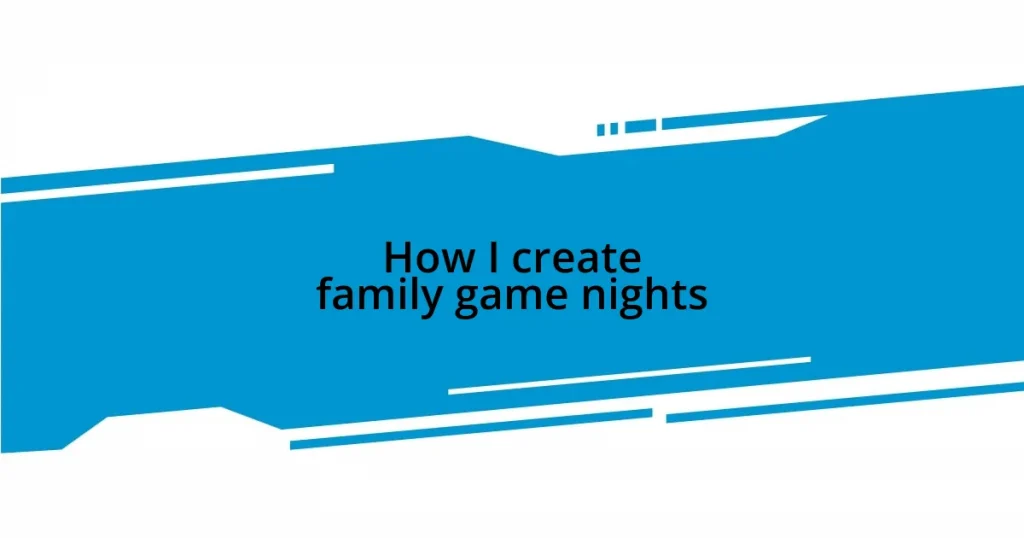Key takeaways:
- Family game nights enhance bonding, communication, and teaching life lessons through engaging activities and discussions.
- Choosing the right games based on family interests and mixing different game types maintains excitement and encourages participation.
- Setting a regular schedule for game nights fosters anticipation and builds family rituals, while flexibility allows for adjustments as needed.
- Creating a comfortable atmosphere and planning snacks elevates the experience, making game nights feel special and festive.

Benefits of Family Game Nights
Family game nights offer a wonderful opportunity for bonding. I remember one evening when my son and I teamed up in a heated game of Uno. The laughter and friendly competition drew us closer, reminding me how essential these moments are for building lasting memories.
Another benefit is the boost in communication skills. During game nights, we often discuss strategies, share jokes, and engage in lighthearted banter. Have you ever noticed how conversations flow more freely when everyone is having fun? I find that these relaxed interactions help my family express themselves more openly in everyday life, which fosters deeper connections.
Moreover, family game nights can be a fantastic way to teach important life lessons. I recall a moment when my daughter faced defeat in a game. Instead of frustration, we turned it into a conversation about perseverance and resilience. How often do we get the chance to discuss such values in a casual setting? These evenings become much more than just playtime; they transform into valuable life lessons wrapped in fun.

Choosing the Right Games
Choosing the right games for family game night can truly set the stage for a memorable evening. I always consider the age and interests of my family members when selecting a game. For instance, younger kids often enjoy games with simple rules and vibrant themes, while older children and adults might appreciate more strategic challenges. Have you ever found yourself stuck with a game that just didn’t resonate with anyone? I have, and it was a learning moment that taught me the importance of involving everyone in the decision.
Moreover, I like to mix up game types each week to keep things fresh. One week, we might dive into a cooperative game like Pandemic, where we work together against a common enemy. The next, we might choose a lighthearted party game like Telestrations that leads to hilarious sketches and stories. This variety not only maintains excitement but also reveals different sides of each family member. I remember one night when a surprise winner emerged in a competitive game of Codenames, leaving us all in stitches—those moments of unexpected joy are what I treasure most.
Lastly, I’ve learned to gauge the mood of the evening. If the kids are buzzing with energy, a fast-paced game like Jenga can channel that enthusiasm. But on a quieter evening, a more relaxed board game like Ticket to Ride fits the bill perfectly. Being flexible and reading the room has helped me create a fun atmosphere that keeps everyone engaged. What’s your go-to strategy for reading the mood in your family?
| Game Type | Best For |
|---|---|
| Cooperative Games | Family bonding, teamwork |
| Competitive Games | Building excitement, playful rivalry |
| Party Games | Light-hearted fun, laughter |
| Strategic Games | Older kids and adults |
| Relaxed Games | Quieter evenings, casual play |

Setting a Regular Schedule
Setting a regular schedule for family game nights is a game-changer (no pun intended!). By designating a specific day each week, my family knows what to expect and looks forward to it. I remember when we committed to Friday evenings; it became a much-needed break from the chaos of the week. Knowing our time together is on the calendar makes it feel special.
- Consistency Builds Excitement: The kids start asking about game night as the week progresses.
- Creates Family Rituals: It’s a tradition that everyone can rely on.
- Encourages Participation: Having a set time means no one will miss out on the fun.
Life can get busy, and I’ve learned that flexibility is important, too. Sometimes, we adjust the schedule to accommodate everyone’s commitments, but we always make sure to communicate. I recall one time when a game night had to shift to Sunday due to sports events, but that only made it more special. Chasing away the Sunday blues with laughter and friendly competition felt like a much-needed family retreat. Embracing these moments, whether they happen on Friday or Sunday, reinforces the importance of simply being together.

Creating a Comfortable Space
Creating a welcoming atmosphere sets the tone for a fun-filled game night. I always ensure that our play area is cozy, with soft cushions and blankets for snuggling up. I remember one night when we draped fairy lights around the living room. The moment we turned them on, it transformed the space into a magical setting that sparked excitement and joy. Have you ever felt how just a few small changes can completely uplift the mood?
I like to take a few extra moments before game night to tidy up and eliminate distractions. This makes it feel intentional—a dedicated space for just us. Once, I found a basket that caught my eye and filled it with snacks and drinks. The kids loved that they could easily grab their favorite munchies while we played, which made it feel like a true event. It’s those little touches that make everyone feel more at ease and ready to join in the fun.
Lighting can also play a significant role in creating a comfortable space. I’ve noticed that warm, soft lights encourage a relaxed vibe, while brighter lights can ramp up the excitement. On a particularly chilly evening, we once ignited a few candles, and the warmth they provided was both literal and figurative. It truly becomes a haven for laughter and connection. What kind of ambiance do you think works best for your family?

Planning Snacks and Refreshments
Planning snacks and refreshments is often one of the most fun parts of our game night preparations. I like to mix it up with a combination of sweet and salty treats. One memorable evening, I decided to create a “snack bar” with popcorn, candy, and a few homemade cookies. It felt like a mini concession stand, and the kids loved having the freedom to pick their favorites while we strategized our game plan. Have you ever noticed how the right snacks can elevate the experience and make it feel more festive?
I’ve found that incorporating some healthy options can be a game-changer, too. Carrot sticks, apple slices, and a yogurt dip not only balance out the indulgent snacks but also introduce a bit of nutrition amidst the fun. Once, we had a game night themed around space, and I named the veggies “rocket fuel” and the fruit slices “planets.” This playful labeling brought out the kids’ creativity and made munching on healthy goodies feel like part of the adventure. How can you creatively incorporate healthier options into your family’s game night?
Drinks are equally important and can really tie it all together. I often whip up a signature family drink, like homemade lemonade or a fruity mocktail, to match the evening’s theme. I remember one time we made a “potion” with sparkling water and colorful fruit slices—it not only looked magical but sparked a fun conversation about what kind of magic it held. The joy of sharing these delightful moments over snacks and drinks truly enhances our time together. What creative drink ideas have you tried that brought an extra spark to your gatherings?

Engaging Family Members
Involving everyone in the choice of games helps create excitement and anticipation. I remember one night when we set up a mini “game draft” with a spinning wheel of options. Each family member took turns spinning it, and the look of joy on the kids’ faces when their favorite game landed on the wheel was priceless. Have you ever seen how involving everyone fosters a sense of belonging and shared excitement?
When the games are chosen, I often assign roles or teams that mix different family members. One evening, I paired my oldest with my youngest for a cooperative game, and they ended up strategizing together. The bond that formed between them as they tackled challenges side by side was heartwarming. How do you encourage collaboration among your family during game night?
Lastly, I’ve discovered that stories and jokes from past game nights can spark laughter and connection. Sharing tales about the hilarious moments—like when our dog decided to join a board game by knocking over a tower of blocks—creates a narrative that entwines our shared experiences. I believe these memories make our time together more vibrant and meaningful. What memorable moments from your family game nights do you cherish the most?

Tips for Successful Game Nights
Creating a successful game night goes beyond just the games themselves; it’s all about the atmosphere. One tip I swear by is to set the right mood with some fun lighting and maybe even a theme. I remember a particularly icy winter evening when we draped cozy blankets around the living room and turned on fairy lights. It sparkled like a magical winter wonderland, and immediately, everyone felt the excitement in the air. Have you noticed how a little ambiance can completely shift the energy of the night?
Timing is also crucial for keeping everyone engaged. When we’ve held marathon sessions, I’ve seen the energy dip around the fourth game. So, I’ve learned to sprinkle in breaks for snacks or even quick stretches. Just the other week, we had a pause to share a funny story about a game gone wrong, which had everyone laughing and re-energized for the next round. How do you manage the rhythm of your game nights to keep spirits high?
Finally, I cannot stress enough the importance of flexibility. Sometimes the game you planned just doesn’t hit the mark. On one occasion, we started with a strategy game that quickly had the youngest in tears due to its complexity. Rather than pushing through, we switched to a classic card game, and the transformation in everyone’s mood was immediate. Do you ever feel the pressure to stick with a plan even when it’s not working? I find that keeping a few quick alternatives on hand can save the night and keep the focus on fun and connection.
















